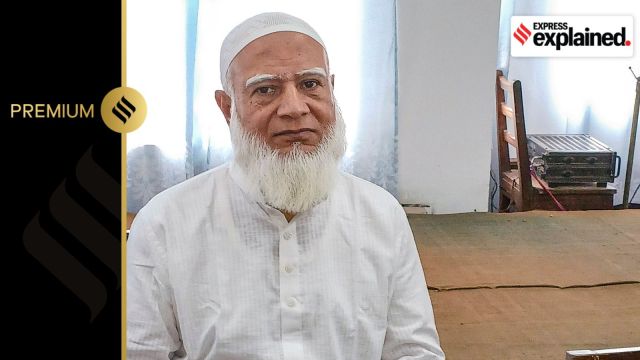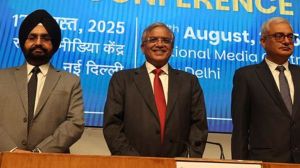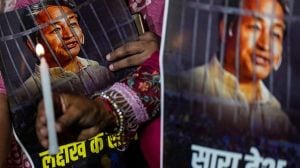Who are the Jamaat-e-Islami Bangladesh, the country’s largest Islamist party?
The Jamaat was barred from contesting elections in 2013 on the ground that its charter violated Bangladesh's constitution by “opposing secularism”.
 Dr Shafiqur Rahman, Ameer (Supremo) of Bangladesh's Jamaat-e-Islami during an interview. (PTI Photo)
Dr Shafiqur Rahman, Ameer (Supremo) of Bangladesh's Jamaat-e-Islami during an interview. (PTI Photo)Bangladesh’s interim government on Wednesday (August 28) lifted the ban on the Bangladesh Jamaat-e-Islami, paving the way for its return to active politics.
The Sheikh Hasina government had cracked down on the Jamaat for being a “militant and terrorist” organisation, and hanged or imprisoned many of its top leaders for “war crimes” committed during the 1971 Liberation War. The Jamaat was barred from contesting elections in 2013 on the ground that its charter violated Bangladesh’s constitution by “opposing secularism”.
On Wednesday, interim Law Affairs Adviser Asif Nazrul said the ban on the Jamaat was “politically motivated” and “not based on ideology”, The Associated Press reported.
Largest Islamist party
On its website, the Jamaat says it wants to “safeguard the independence, territorial sovereignty and Islamic values of Bangladesh”, and “implement the Islamic code of life… with a view to turning Bangladesh into an Islamic welfare state…”.
Bangladesh’s “largest Islamic party” traces its roots to the Jamaat-e-Islami established in Lahore in 1941 by Islamic theologian Abul Ala Maududi. Its foundational goal was to promote Islamic values in India, and eventually establish an unified Islamic state in the subcontinent.
The Partition — which the Jamaat actively opposed — dashed its original plans. After 1947, the organisation split on country lines. In India, the Jamaat was largely relegated to political irrelevance, but its influence grew in both wings of Pakistan.
Role in Liberation War
While India was partitioned on religious lines, Pakistan struggled to hold together its geographically separated and culturally dissimilar East and West. Soon, the Bengali-speaking people in the East rebelled against the dominance of the Urdu-speaking West Pakistani elite, and started to demand first greater autonomy, and eventually a separate country.
Jamaat, with its goal of keeping Muslims together, opposed the partition of Pakistan, and stood firmly with the (West) Pakistani establishment. It provided leadership and manpower to paramilitary organisations and committees established by the Pakistan Army to crush the freedom struggle.
These included the Al Shams and Al Badr armed groups, which were recruited from the Jamaat’s student wing, and the East Pakistan Central Peace Committee, also known as the Shanti Committee. Ghulam Azam, then leader of the Jamaat in East Pakistan, was one of the founding members of the Shanti Committee.
These “razakars” (collaborators), along with the Pakistan Army (largely made up of West Pakistani recruits) carried out innumerable atrocities and human rights violations during the Liberation War, including the targeted killing of Bengali intellectuals, torture, abductions, rapes, and attacks on the minority Hindus.
Some 3 million people are estimated to have been killed during the nine-month Liberation War, more than 200,000 women were raped, and about 10 million were forced to flee East Pakistan.
Activities in Bangladesh
Sheikh Mujibur Rahman banned all religious organisations from participating in politics. Many Jamaat leaders, including Ghulam Azam, fled the country to escape prosecution for their role during the war. The Jamaat was effectively wiped out from Bangladesh.
Bangladesh passed the International Crimes Tribunal Act in 1973 “to provide for the detention, prosecution and punishment of persons for genocide, crimes against humanity, war crimes and other crimes under the international law”.
But it would be decades before anyone would be actually prosecuted. Mujib was assassinated by a group of army officers in 1975, and Bangladesh then witnessed a series of coups, counter-coups, and military rule under various individuals. The Awami League remained out of power until 1996, and the Jamaat made a comeback during this time.
Ziaur Rahman, one of the individuals behind Mujib’s assassination and the 1975 coup, would eventually lift the prohibition on religious parties from entering politics, and his Bangladesh Nationalist Party (BNP) would ally with the revived Jamaat. His wife Khaleda Zia, who later became prime minister herself (1991-96, 2001-06), continued the alliance.
Crackdown by Hasina
The Jamaat had been rehabilitated during the Khaleda years, but its role during the Liberation War was not forgotten. After coming to power in late 2008, Hasina announced that she would use the 1973 Act to prosecute war criminals. This Act would be amended in 2009, and its ambit expanded.
On March 25, 2010, Hasina’s government announced the formation of a three-member tribunal, a seven-member investigation agency, and a twelve-member prosecution team to prosecute war criminals.
On February 5, 2013, Abdul Quader Mollah, who was a member of the Al Badr militia in 1971, was convicted of killing 344 civilians among other war crimes, and sentenced to life in prison. Following massive protests against the “lenient” punishment, the Bangladesh Supreme Court handed Mollah the death sentence. He was executed on December 12, 2013 — the first Jamaat leader to be hanged for war crimes.
Others followed suit: Mohommad Kamaruzzaman in April 2015, Ali Ahsan Mohammad Mojaheed in November 2015, and Motiur Rahman Nizami in March 2016. Numerous others were imprisoned. Ghulam Azam, who had been repatriated during Khaleda’s first term, was given 90 years in prison, where he died in 2014.
The arrests and executions drew widespread international condemnation. The likes of Amnesty International and Human Rights Watch criticised the flimsy process of the tribunal. Hasina’s critics alleged that the war crimes crackdown was a pretext to physically remove the opposition.
The Jamaat too, maintains this position, and denies any role in the atrocities of 1971.





- 01
- 02
- 03
- 04
- 05

































